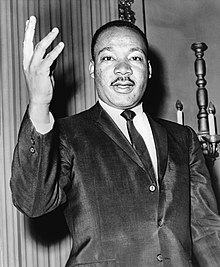Martin Luther King Jr
| Martin Luther King, Jr. | |
|---|---|
 | |
| Born | Michael King, Jr. January 15, 1929 Atlanta, Georgia, United States |
| Died | April 4, 1968 (aged 39) Memphis, Tennessee, United States |
| Monuments | Martin Luther King, Jr. Memorial |
| Nationality | American |
| Alma mater | Morehouse College (B.A.) Crozer Theological Seminary (B.D.) Boston University (Ph.D.) |
| Organization | Southern Christian Leadership Conference (SCLC) |
| Influenced by | Jesus Christ, Abraham Lincoln, Mohandas Karamchand Gandhi, Benjamin Mays, Hosea Williams, Bayard Rustin, Henry David Thoreau, Howard Thurman, Leo Tolstoy |
| Political movement | African-American Civil Rights Movement, Peace movement |
| Religion | Baptist (Progressive National Baptist Convention) |
| Spouse(s) | Coretta Scott King (m. 1953–68) |
| Children | Yolanda Denise-King (deceased) Martin Luther King III Dexter Scott King Bernice Albertine King |
| Parents | Martin Luther King, Sr. Alberta Williams King |
| Awards | Nobel Peace Prize (1964), Presidential Medal of Freedom (1977, posthumous), Congressional Gold Medal (2004, posthumous) |
| Signature |  |
A Baptist minister, King became a civil rights activist early in his career.[4] He led the 1955 Montgomery Bus Boycott and helped found the Southern Christian Leadership Conference (SCLC) in 1957, serving as its first president. King's efforts led to the 1963 March on Washington, where King delivered his "I Have a Dream" speech. There, he established his reputation as one of the greatest orators in American history. He also established his reputation as a radical, and became an object of the Federal Bureau of Investigation's COINTELPRO for the rest of his life.
On October 14, 1964, King received the Nobel Peace Prize for combating racial inequality through nonviolence. In the next few years leading up to his death, he expanded his focus to include poverty and the Vietnam War—alienating many of his liberal allies with a 1967 speech titled "Beyond Vietnam". King was planning a national occupation of Washington, D.C., called the Poor People's Campaign.
King was assassinated on April 4, 1968, in Memphis, Tennessee. He was posthumously awarded the Presidential Medal of Freedom in 1977 and Congressional Gold Medal in 2004; Martin Luther King, Jr. Day was established as a U.S. federal holiday in 1986. Hundreds of streets in the U.S. and beyond have been renamed in his honor





0 Comments:
Post a Comment
Subscribe to Post Comments [Atom]
<< Home